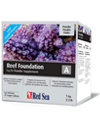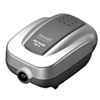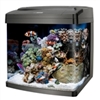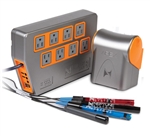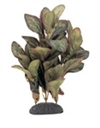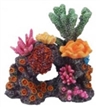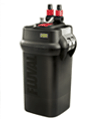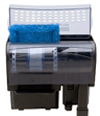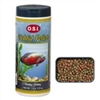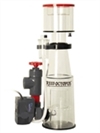Ten Tips for Making Your Aquarium Quieter

There is nothing more relaxing than gazing at a beautiful aquarium. But the aquarium noise can sometimes detract from the experience. Here are ten ways to keep your aquarium quiet.
1. Avoid Falling Water
Free-falling water creates an annoying splashing noise.
If you are using a hang-on filter, keeping your aquarium water level high enough so the filterís water return is partially submerged will reduce the splashing significantly.
For aquarists using sumps, make sure to use stand pipes in the overflow box that stop the water from falling farther down the overflow than needed. Aquarists with sumps will also benefit from having the drain to the sump submerged to reduce splashing.
Aquarists using canister filters should make sure the output to the filter is completely submerged and not so high it makes a rippling noise.
OASE BioMaster and
Fluval Canister Filters tend to be quieter than competing filters.
2. Use Soft Plumbing
Vibration is the chief cause of noise in an aquarium. A simple way to stop vibration is to use
soft aquarium hose rather than hard PVC pipe as much as possible. Using soft hose before and after pumps will help to stop vibration from transferring to hard pipes.
3. Dampen Vibrations
In addition to using soft plumbing, there are other ways to limit vibration. Avoid placing water pumps directly on the bottom of sumps or leaning against the sumpís walls. Use the suction cups included with pumps in aquariums and sumps to reduce the amount of vibration transferred from the pump to the hard plastic/glass of the sump/aquarium. Using mouse pads or foam underneath external pumps limits vibration. For submersible pumps, silicon drying mats placed under the pump can help.
4. Use Dual Drain Overflows
If you are using an aquarium with an overflow box and sump, then it helps to use two drains rather than just a single drain. When using two drains one drain should suck from the bottom of the overflow box and have a gate valve below it to adjust flow before draining into the sump. The second drain should draw from the top of the overflow box and drain directly into the sump. Using this method you can adjust the flow from the drain with the
gate valve so that almost all the flow goes through this drain and only a trickle goes through the second drain. This will significantly reduce the gurgling noise that comes from the drain.
5. Use Overflow Mufflers
If you have a sump with only a single drain then you can quiet the drain with a
Maggie Muffler. The Maggie Muffler sits on top of the overflow standpipe and reduces the noise from water falling down the pipe. Even if you have two drains, adding a muffler to the tall standpipe will further decrease noise.
6. Use Quiet Air Pumps
With freshwater aquariums with air pumps the air pump is often the loudest piece of equipment.
Tetra Air Pumps are certainly not silent, but they are quieter than the other air pumps on the market.
7. Use DC Water Pumps
For most aquariums pump noise is the loudest aquarium noise. Switching to equipment using modern DC pumps will significantly reduce noise. We like the
Reef Octopus VarioS Circulation Pumps and the
Reef Octopus Regal Protein Skimmers powered by the VarioS pumps.
8. Use a Stand With a Closed Back
Many entry-level aquarium stands have open backs that allow noise from equipment to escape the stand and fill the room. Choosing a stand with a back or adding a back to your stand will help to contain the noise.
9. Use Modern Lights
Metal halide and T5 lights often have fans and ballasts that make buzzing sounds. LED lights are quieter because they donít have ballasts and they either have small fans, or no fan at all.
10. Clean Your Equipment
When equipment gets dirty it often gets louder. Make sure to clean your pumps by scrubbing them with a tooth brush and occasionally soaking them in
Inland Seas Citric Acid Pump Cleaner. The Citric Acid will take care of mineral deposits and coralline algae build-up. Use compressed air to periodically remove dust from your lights to ensure that the fans donít have to work as hard.







